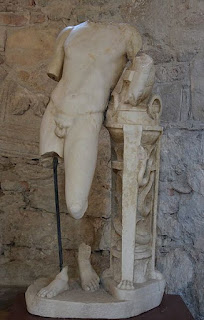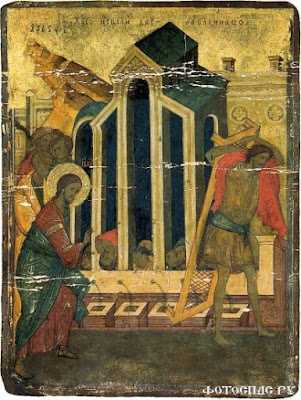The Lord our God defies our assumptions. Jesus Christ and his saints just don't act right. What I mean is, they don't respond to things the way the world thinks they will – or should.
What happens in Philippi is a good example (Acts 16:16-34).
If you and I were unjustly locked in prison and, by a miraculously timed earthquake, our bonds were broken, would we continue to hang out in prison? Or would we take the opportunity to go free? Naturally, most of us would run. That would be natural and even just.
Certainly, the jailer expected Paul and Silas to have run when they were freed. "He drew his sword and was about to kill himself supposing the prisoners had escaped" (Acts 16:27) Perhaps death would have been his punishment anyway had he failed to keep his prisoners imprisoned. I don't know. But, in any case, Paul demonstrates more love and solicitude for his jailer than for himself, crying out with a loud voice to the one who imprisons him, "Do not harm yourself, for we are all here" (Acts 16:28).
This is simply not how a worldly man behaves. A worldly man looks out for himself – looks out for number one, as it were. But Paul – and we like Paul – have our life in Jesus Christ. We're already taken care of. Our selves are already provided for and infinitely loved. We are already free and should fear neither prison nor death. It takes a profound faith to see the truth that we are actually free even while yet in prison in this world. And this faith frees us to care for those who are still enslaved to death, even while it seems they walk free in this world.
The jailer was enslaved to death – about to kill himself for failing at his job because of something he had no control over – an earthquake. He was the jailer, not the one inside the jail, and yet it was him that was actually imprisoned. Meanwhile, Paul and Silas, though being kept in prison, were actually free – free to act contrary to the expectations of this world – free to love and care for even those who seem to be their enemies.
Paul and Silas made these enemies in the first place by disturbing those who would seem to be their friends. When you really follow Christ you always end up sticking out like a sore thumb – caring for those the world expects you to hate and opposing those the world imagines to be on your side.
Before they were locked up, Paul and Silas and some other disciples were followed around by a girl for many days. She kept crying out to all who would listen, "These men are servants of the Most High God, who proclaim to you the way of salvation" (Acts 16:17). So, it would seem she was their friend, right?
The words this girl proclaims are true. Paul and Silas and Luke were and are indeed servants of the Most High God – the same God of Melchizedek, priest of the Most High God (Gen 14:18), and of Jesus, Son of the Most High God (Luke 1:32). And they do indeed proclaim the way of salvation. At this time, Christianity is called "the way" (Mark 1:2, John 14:6, Acts 9:2; 19:23).
But Paul doesn’t allow her to keep speaking this truth. Why? That seems against his own interests – from a worldly point of view. It's kind of funny, but he turns to her and charges the spirit out of her in the name of Jesus Christ because she was annoying him. Why was he annoyed? What was she doing that was so annoying? She was, as I say, proclaiming true words to the people. What's wrong with that?
You might think that Paul would appreciate the publicity that the word of God would get from her endorsement. After all, this was a girl people listened to. She had such a good reputation for speaking the truth that her owners were able to make a lot of money from what she would say. She spoke with such veracity that the people in Philippi believed her word. You have a burning question, you take it to this soothsaying slave-girl, pay her owners a sum of money of course, and you get an answer that you can trust.
And here she is speaking the truth about Paul, about God, and about salvation. And Paul is annoyed and does what he has to do to shut her up. She's giving them good press. But somehow Paul doesn't want it. I thought he was trying to get the word out! What's he doing stifling the message? As I said in the beginning, Jesus and his saints defy assumptions and often act contrary to worldly expectations.
For one thing, Paul is considering the source. “Jesus our Lord does not accept witness from demons” and neither does Paul.[1] Even when demons speak the truth, it's better to shut them up. Remember, the demons often recognize Jesus for who he really is long before the crowds do. And Jesus shuts them up (e.g. Mark 1:25). When a demon is speaking truth you can bet he's getting ready to slip in a lie.
The right words are one thing and the right understanding is another. Some among those who refer to the Most High God, especially in antiquity, fail to also recognize that God is the one true God – that is that there is truly but one and only one God. Some who speak of the Most High God are not monotheists at all but are rather what they call henotheists. These are those believe there are many gods but who regard one God as superior to all the other gods. The devil loves a half-truth better than an outright lie. Because a half-truth can go further toward deceiving those who have only a passing acquaintance with the truth. As the poet Arator says, “[Though] she who was a servant of falsehood prophesies what is true, let us not be corrupted by the bitter honey of deceit.”[2]
When the demon is talking about the Most High – and this isn't the only time in the New Testament that a demon refers to the Most High God (e.g. Mark 5:7) – you can bet that demon has a twisted understanding of the name. Remember, Lucifer says he will make himself “like the Most High” (Isaiah 14:14). The term Most High can be twisted by a blasphemous spirit to suggest there is not one but many – and that the others are just less high. Twisting further, it might question which of the many is really most high. And down and down, twisting and twisting we go with demonic reasoning. So, it's better to shut up the demon while it’s still speaking truth before it gets to half-truths and before it gets to believable lies.
 |
| Marble statue of Pythian Apollo leaning on the Delphic tripod encoiled with a serpent and holding Apollo's tortoise shell lyre, Apollonia, Albania |
By the way, demons are able to predict the future so well not because they know the future but just because they are so extremely intelligent and experienced. Human events have a pretty predictable pattern. History repeats a lot. And if you could remember all the detail of all the millennia back to the dawn of creation with perfect recall, you'd be pretty good at predicting the future too. Sometimes they get it wrong though – like when God becomes man. They didn't see that coming. That had never happened before. They weren't prepared for the ramifications of that. That one was coming from before the dawn of creation. They may be old, but there's someone who's older – truly Ancient of Days (Dan 7:9).
Regardless, this girl’s owners were able to use her and this spirit to gain a great deal of money from her soothsaying. Now I don't know if you've noticed, but the Spirit of God and the spiritual beings that love and serve God – that is, the angels – and those who live and act in the Holy Spirit are not in it for the profit. This is a remarkably reliable way of discerning whether a prophet is a true prophet or false prophet. Are they in it for the money? Are they prophets for profit? I recommend you give those who are in it for the money a wide berth rather than a fat check.
This girl was enslaved in more than one way by more than one force. She was enslaved in body to her owners and she was enslaved in spirit to a spirit of Πύθων. Paul delivers her from her enslavement to the demon. He does not oppose her but undoes the work of her owners and of the demon in her. Which is why her owners press for Paul’s and Silas’ imprisonment.
If we follow the way of the Lord and live in his Holy Spirit, our way of life will confound all those around us. But like the slave girl, they will be delivered. And like the jailer, they will be converted and set free. “Acquire a peaceful spirit and then thousands of others around you will be saved.”[3]












